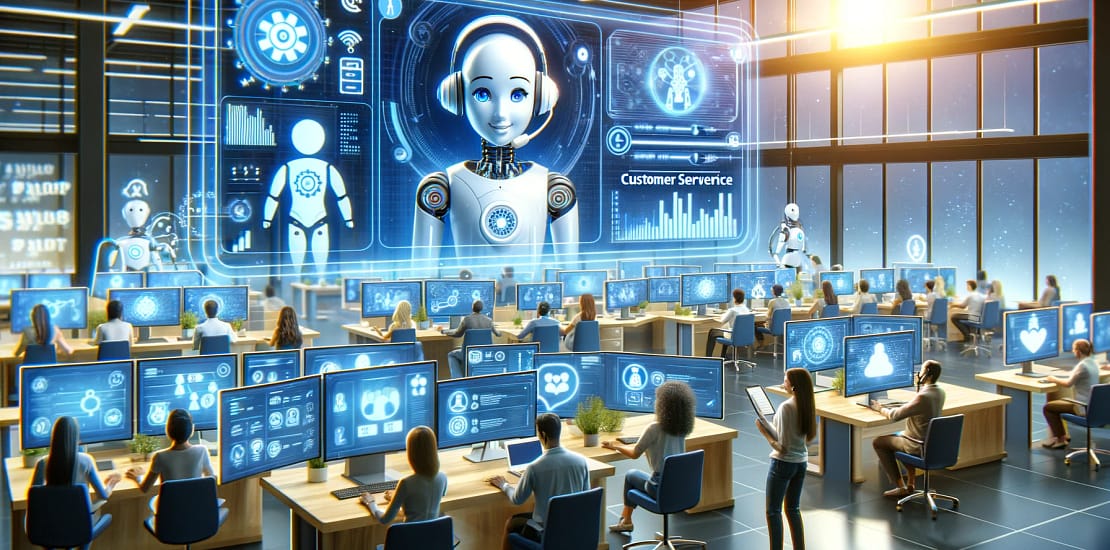Revolutionizing Customer Service: The Power of Chatbots
- January 20, 2024
- Posted by: Cheryl Li
- Category: AI for Customer Experience

In the digital age, customer service has transcended traditional boundaries, evolving into a 24/7 expectation that demands quick, efficient, and personalized responses. Enter chatbots — AI-driven virtual assistants that are transforming the way businesses engage with their customers. By leveraging the capabilities of chatbots, companies across various sectors are enhancing customer satisfaction, streamlining service operations, and unlocking new levels of customer engagement. This blog post explores the transformative impact of chatbots on customer service, highlighting their benefits, applications, and the future of customer interactions in the AI era.
The Rise of Chatbots in Customer Service
Chatbots, utilizing Artificial Intelligence (AI) and Natural Language Processing (NLP), are software programs created to mimic conversations with users in a human-like manner. They can interpret and respond to customer inquiries in real-time, providing information, resolving issues, and even conducting transactions. The integration of chatbots into customer service strategies marks a significant shift towards more automated, efficient, and personalized customer interactions.
Key Benefits of Implementing Chatbots
1. 24/7 Availability
One of the most significant advantages of chatbots is their ability to provide round-the-clock service. Chatbots, unlike human representatives, do not require rest or sleep, guaranteeing customers immediate support at all hours, thereby boosting overall contentment and loyalty.
2. Instant Response Times
In an era where time is of the essence, chatbots excel by providing immediate responses to customer queries. This instantaneity not only improves the customer experience but also reduces the workload on human customer service agents, allowing them to focus on more complex issues.
3. Scalability
Chatbots can handle thousands of conversations simultaneously, making them an ideal solution for businesses experiencing high volumes of customer inquiries. This scalability ensures that service quality remains consistent, even during peak periods.
4. Personalized Interactions

Advanced chatbots can analyze customer data and past interactions to deliver highly personalized service. This personalization can range from addressing customers by name to providing customized product recommendations, creating a more engaging and satisfying customer experience.
5. Cost Efficiency
By automating routine inquiries and tasks, chatbots can significantly reduce operational costs associated with customer service. This cost efficiency enables businesses to allocate resources more effectively, investing in areas that drive growth and innovation.
Applications of Chatbots in Customer Service
Automated Customer Support
Chatbots are adept at handling a wide range of customer support tasks, from answering FAQs to troubleshooting common issues. This automation not only speeds up resolution times but also ensures consistency in the quality of support provided.
Personalized Shopping Assistants
In the retail sector, chatbots are revolutionizing the shopping experience by acting as personal shopping assistants. They can offer product recommendations, provide stock updates, and even facilitate transactions, creating a seamless and interactive shopping journey.
Booking and Reservations

For the travel and hospitality industries, chatbots are simplifying the booking process by enabling customers to make reservations for flights, hotels, and restaurants through conversational interfaces, streamlining the planning phase of travel.
Feedback Collection
Chatbots can also gather valuable customer feedback through interactive surveys and questionnaires, providing businesses with insights into customer preferences and areas for improvement.
Overcoming Challenges and Limitations
While chatbots offer numerous advantages, they are not without their challenges. Limitations in understanding complex queries, lack of empathy, and potential data security concerns are some of the hurdles businesses may face. Overcoming these challenges involves continuous refinement of AI algorithms, ensuring chatbots are equipped to handle a broader range of inquiries and integrating human oversight to manage more sensitive or complicated issues.
The Future of Chatbots in Customer Service
The future of chatbots in customer service looks promising, with advancements in AI and machine learning poised to enhance their capabilities further. Emerging trends include the integration of voice recognition technology, enabling voice-based chatbot interactions, and the use of sentiment analysis to better understand and respond to customer emotions. As these technologies evolve, chatbots are expected to become even more indistinguishable from human agents, offering an unprecedented level of convenience and personalization in customer service.
Conclusion
Chatbots are redefining the landscape of customer service, offering a blend of efficiency, personalization, and innovation that traditional service channels struggle to match. By harnessing the power of AI, businesses can not only meet but exceed customer expectations, fostering loyalty and driving long-term success. As we move forward, the role of chatbots in customer service will continue to expand, shaping the future of customer interactions in an increasingly digital world. Whether it’s through enhancing customer support, personalizing the shopping experience, or streamlining bookings and reservations, chatbots are at the forefront of the customer service revolution, heralding a new era of digital engagement.

